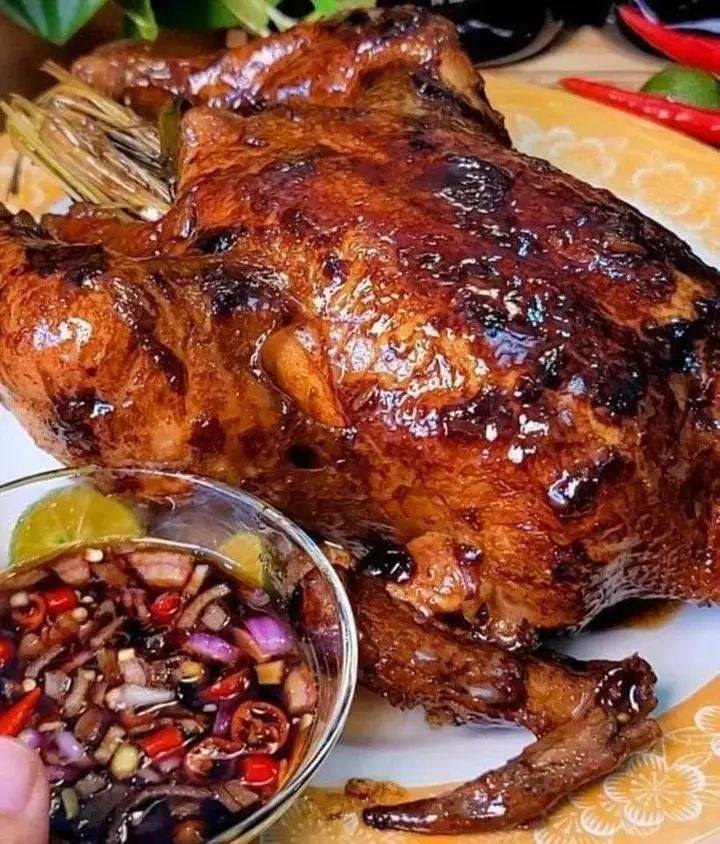Instructions for Making Lechon Manok
1. Prepare the Chicken:
Clean the chicken, removing any excess fat or giblets. Pat the chicken dry with paper towels. Drying the chicken helps the skin crisp up when roasting.
If you want extra flavor, carefully loosen the skin from the chicken’s meat using your fingers, being careful not to tear the skin. This allows the marinade to penetrate deeper into the meat.
2. Make the Marinade:
In a large bowl, combine the soy sauce, calamansi juice (or lemon juice), fish sauce, brown sugar, minced garlic, ginger, black pepper, olive oil, sesame oil, salt, and paprika. Whisk everything together until the sugar is dissolved and the marinade is well-mixed.
Add the lemongrass stalks and bay leaves if you’re using them. These will infuse the chicken with an extra layer of aromatic flavor during the roasting process.
3. Marinate the Chicken:
Rub the marinade all over the chicken, making sure to cover every surface of the chicken, including the inside cavity. For the best flavor, let the chicken marinate in the refrigerator for at least 2 hours, but preferably overnight.
If you’re in a hurry, marinate for 30 minutes at room temperature. The longer the chicken marinates, the more intense the flavor will be.
4. Stuff the Chicken (Optional):
If you’re using stuffing, fill the chicken’s cavity with the quartered onion, crushed garlic, lemongrass stalks, and lemon or lime wedges. This adds more fragrance and flavor to the chicken as it roasts.
5. Preheat the Oven:
Preheat your oven to 375°F (190°C). If you’re using a rotisserie, follow your rotisserie machine’s instructions for cooking temperature.
6. Roast the Chicken:
For a traditional oven, place the chicken on a roasting rack or directly on a baking sheet, breast-side up. If you have a roasting rack, it’s best to elevate the chicken so it cooks evenly on all sides.
Roast the chicken for about 1 hour and 20 minutes, or until the skin is golden brown and crispy, and the internal temperature reaches 165°F (74°C) when measured with a meat thermometer.
To keep the chicken moist and to help it brown evenly, baste it with its own juices halfway through the roasting process. You can also spoon some of the marinade over the chicken for extra flavor.
7. Rest the Chicken:
Once the chicken is fully cooked, remove it from the oven and let it rest for about 10 minutes. This allows the juices to redistribute inside the chicken, keeping the meat tender and juicy.
8. Carve and Serve:
Carve the chicken into serving pieces, being sure to cut through the crispy skin. Serve with steamed rice, a side of dipping sauce, or your favorite Filipino condiments like sawsawan (a mixture of vinegar, soy sauce, and chili).
Garnish with fresh herbs or additional lime wedges if desired.
Tips for the Best Lechon Manok:
Marinate Longer for Deeper Flavor: The longer you marinate the chicken, the more flavorful it will be. Marinating overnight will allow the spices and seasonings to fully penetrate the meat.
Crispier Skin: For extra crispy skin, make sure to pat the chicken dry before marinating, and avoid covering the chicken with foil during roasting. If using a rotisserie, the rotating motion will help crisp the skin evenly.
Stuffing Options: If you prefer a more robust stuffing, you can add other ingredients like herbs (rosemary, thyme), chopped vegetables, or even cooked rice for a more traditional filling.
Grilling Option: If you have access to a grill, you can cook the chicken over indirect heat for that smoky, outdoor flavor that lechon is known for. Just make sure to monitor the chicken’s temperature and rotate it periodically to ensure even cooking.
Rest the Chicken: Always let the chicken rest after roasting. This helps the juices redistribute, making the chicken more tender and flavorful.
Why Lechon Manok is a Filipino Favorite:
Lechon Manok is more than just a meal—it’s a tradition. Whether you’re celebrating a special occasion or enjoying a casual family dinner, lechon manok brings people together with its irresistible aroma and flavor. It’s one of the most popular dishes in Filipino cuisine, often served alongside rice and various dipping sauces.
The combination of savory, sweet, tangy, and smoky flavors is a hallmark of Filipino cooking, and lechon manok is a prime example of how these ingredients come together to create something truly special.
Conclusion:
Lechon Manok is a true Filipino classic that is sure to impress. With its tender meat, crispy skin, and flavorful marinade, this dish is perfect for any occasion, from family dinners to festive celebrations. It’s easy to prepare, full of rich flavors, and guaranteed to be a hit with anyone who tastes it.
So, next time you’re looking for a dish that packs a punch of flavor and a lot of love, try making Lechon Manok at home. It’s a Filipino feast that will make everyone feel like they’re part of the celebration!

